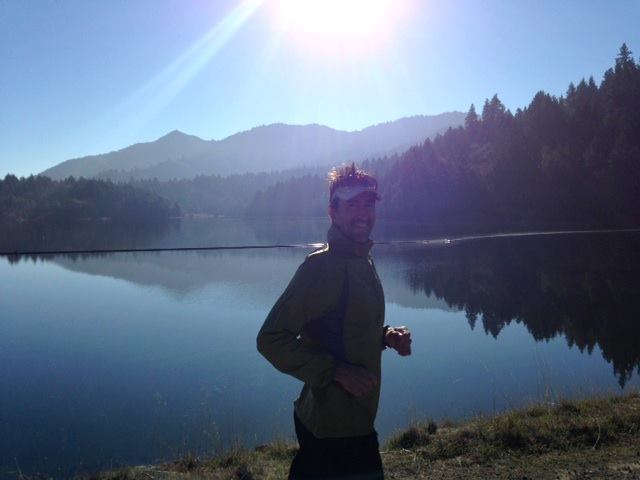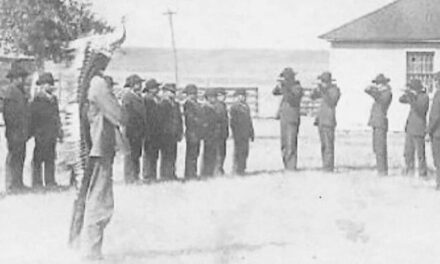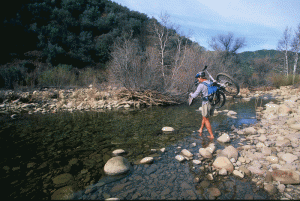- Tahoe’s Nevada Beach Tops the List of Hard-to-Book Campgrounds - 07/17/2024
- Cannabis Watershed Protection Program Cleans Up Illegal Grow Sites - 07/10/2024
- French Fire - 07/05/2024
By Gordon Wright
I was running in the hills above my house the other day, and it was lovely. Lovely, but lonely. I hadn’t seen a single person since I started my single-track loop, so I was in my default slouch, shuffling along slowly, until I rounded a bend and saw someone coming towards me.
Like every male who’s ever lived, I picked up my pace, squared my shoulders and put a bounce in my step, because evolutionarily, I was supposed to either fight this person to the death, or take them for my mate. That’s absurd, right? Surely we’ve evolved beyond that. Or have we?
It turned out that my fellow runner was a woman, and she was not squaring her shoulders and effecting a smart stride. She was edging way off towards the side of the trail. She did not respond to my “Hey there,” nor my wave. She did not make eye contact. She was quite alone, and quite frightened.
She was frightened because she was a female, and I was a male. Despite us both being runners, despite sharing a sublime day on a perfect trail, her instinct was not evolved — it was primal.
When I shared that story with my wife, an avid trail runner, she said, “That’s totally normal. That’s how women feel when they’re isolated and alone with a strange man, even one as dorky as you.” It turns out that she had herself been out the prior weekend, on a nearby trail, and turned around when she spied something up ahead that didn’t suit her. “It was a young guy, not wearing the right clothes for a hike, just kind of resting on his back with his feet on the trail,” she said. “He had a big backpack and I don’t know — it just didn’t look right.” And so she turned back, cutting her run short.
This sort of calculus is a daily part of running for women. A co-worker of mine told me, “I’m always looking for a threat, and how to handle it. What is that guy doing? Where is a good bailout point? If this guy does something, how do I defend myself? Why do you think women run in groups so often?”
This constant vigilance doesn’t even have to happen consciously. Dr. Judith Orloff, an assistant clinical professor of psychology at UCLA, recently told WebMD that it also operates at a much more basic level: “Just like the brain, there are neurotransmitters in the gut that can respond to environmental stimuli and emotions in the now — it’s not just about past experiences.”
This sounded grim, and unfamiliar. The only times I’ve felt threatened on a trail run, it was because I got passed by someone faster than me, or because I was facing down a mountain lion. The former happens frequently; the latter, thankfully, only once.
Women running alone now have even more esteem in my eyes. I can’t honestly say that I’ve ever given much thought to it before seeing the light, but now it pains me to see a woman running alone and think, “I hope she doesn’t think I’m a creep.” And I’m not even sure if a male writer is the right one to bring it up.
Thankfully, the website Jezebel has a few tips for men, originally designed for urban environments, but easily transferred to the trail:
1. Act normal. Just treat a woman running towards you like you’d treat any random guy. Don’t do anything you wouldn’t normally do—and that includes any gestures that you’d consider to be gentlemanly. Stepping off the trail and throwing your shirt across a mud puddle might seem chivalrous to you, but is actually creepy.
2. Don’t get close. Again, you don’t want to scamper up a scree slope to avoid someone — we’re trying to act normal—but just give a lady her space.
3. Announce yourself. Are you coming up behind a woman, or even two? Let them know you’re there, especially if they’re in deep conversation. I usually say, “On your left,” or “Runner!” to let them know I’m coming, and I’m more concerned with my pace than their yoga pants.
4. A quick hello will suffice. Jezebel suggests, “Greet her with a little eye contact and a hello, or even no hello,” but I prefer no direct eye contact and a weary wave that says, “Hello fellow trail runner. I am too tired to vocalize, or notice your gender.”
5. If you want to talk more, wait for a better opportunity. I cannot think of a single instance where Jezebel’s advice would pertain to a trail run. Wait for a woman at the only other car at the trail head? You look like a psychotic. Leave a note? Stalker. What are you doing hitting on women on a trail anyway? Perhaps a post-race BBQ would be an ok place to introduce yourself, but otherwise, no.
In summary, Jezebel suggests that men should just be aware of the issue; that women rightfully feel threatened around men in isolated environments. Spread the word to act considerately — the more men and women talk about it, the better.
Gordon Wright is a publicist and freelance writer. He lives in Marin County and has a long and complicated history with running.














